
The River Center, located in Burt Reynolds Park in Jupiter, is offering educational field trip programs to public, private, and charter throughout the fiscal school year. Through support from the Loxahatchee River District, the River Center provides these programs for FREE.* Our programs our designed to meet the Next Generation Sunshine State Standards for kindergarten through 12th grade. Our mission is to foster a sense of environmental stewardship for the Loxahatchee River’s diverse watershed with quality programs, educational exhibits, and meaningful events.
The 2023 & 2024 school year availabilities are completely booked. See below for waitlist.
Join WaitlistBookings and reservations are not complete until you receive a personal email from a River Center Staff Member.
Programs are staff and facilities dependent. The River Center reserves the right to change or modify your program.
Program Days: Tuesday – Friday
Program Times: 10 a.m. – 12 p.m. (All Groups)
Group Size: Minimum of 10 students, Maximum of 50 students.
Bus Funding: The River Center has qualified as a field trip destination for free bus funding through the Palm Beach County School Board. Check with your school administrator/bookkeeper for details and scheduling. Please note free bus funding is limited, please check to be sure your trip will receive funding.
Programs offered: October – May
Download course materials for standards and benchmarks as well as pre and post lesson plans.
*Some fees apply for specific programs.

Sea Urchin Lab
Students get an introduction into the scientific method and discussion on observation driven experiments using live animals. Students will participate in an activity to learn how sea urchins survive in their environment; compare them to other aquatic species, and the adaptations necessary for their survival.
Recommended: Grades K-1 (adaptable for ESE)

Shark Senses
Students learn that sharks have two additional senses and activities will help them understand how keen shark senses are. Classes will also explore the River Center’s Jupiter Shark Exploration exhibit to learn about different local species, biology, and what makes them top predators.
Recommended: Grades K-1
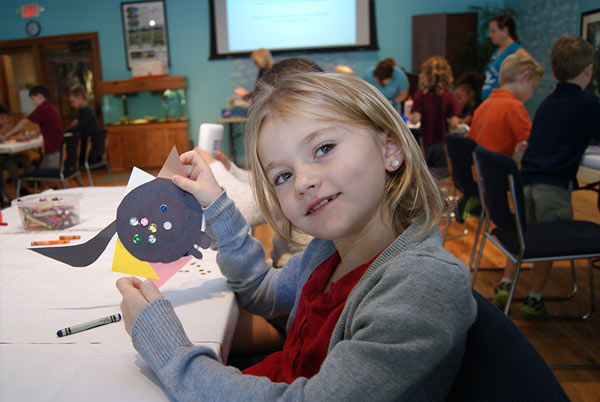
Fish Morphology
This fun and unique program provides a detailed look into the differences between fish species and adaptations found throughout nature that allows them to survive. Students get the opportunity to create their own fish using different art media to create different adaptations based on their ecosystems and specific habitats.
Recommended: Grades K-1

Reptiles of the Loxahatchee
Reptiles are considered eco-enrichers and play a significant role in the Loxahatchee River ecosystem. Alligators, freshwater turtles, and snakes have unique adaptations that allow them to thrive in our swamps and marshes. Get up close with some of the resident reptiles, learn about their interesting characteristics, and discover what makes them unique!
Recommended: Grades 1-4
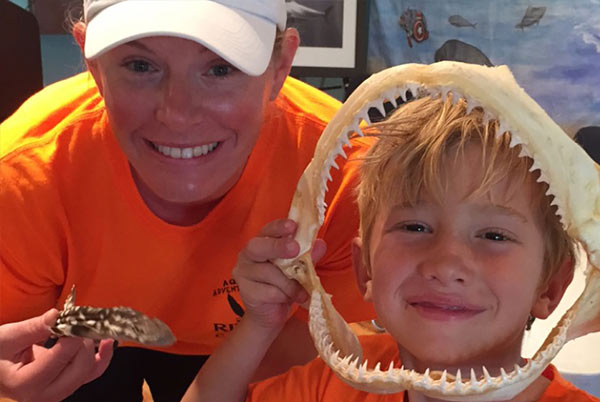
Shark Habitats
Classes will learn about local species, adaptations, biology, and what makes sharks top predators. Students will learn about shark habitats in the Loxahatchee River including estuaries, coral reefs, and the open ocean and understand why it is important to protect habitats locally and world-wide.
Recommended: Grades 2-3

Ocean Currents and Plastic Voyages
Students will learn about the production of plastic, how it’s used, and problems that are created when plastics become marine debris. Students will participate in hands-on activities about pollution solutions, as well as create innovations and ideas for reducing, reusing, and rethinking single-use plastics.
Recommended: Grades 4-5
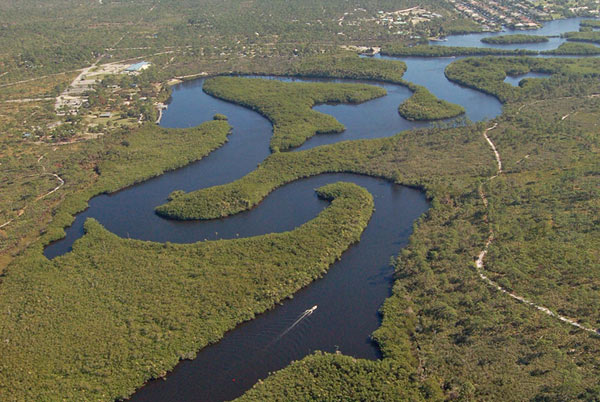
Habitat Conservation
Students learn what a habitat is and what resources animals need to survive. They will understand the struggle animals face in their fight for survival. This modified version of Tag explains the relationship between predators and prey, including habitat protection, human impacts, and restoration.
Recommended: Grades 2-4
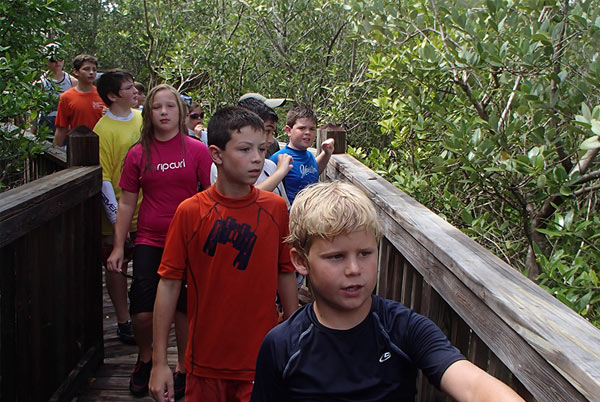
Mangrove Adaptations
Students will identify mangrove species, adaptations, and the vital role they play in Florida’s ecosystem. They will understand the energy flow throughout the estuary including the mangrove producers, juvenile fish nurseries, predatory food supply, and decomposers. Students will compete in a mangrove tug-of-war relating to mangrove estuaries, ocean energy, and human influences.
Recommended: Grades 3-5 (adaptable for 6-12)
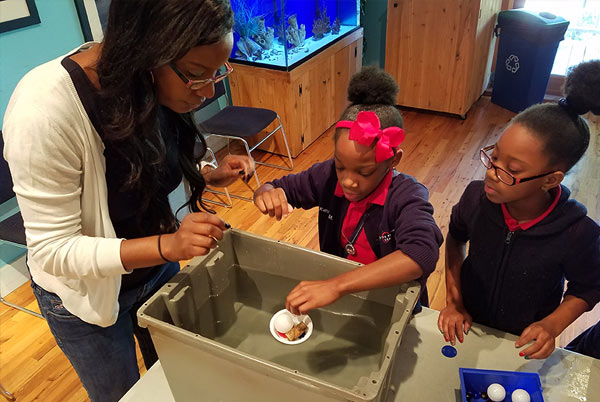
Water Properties Lab
Students will work in an interactive lab that covers the properties of water including density, buoyancy, surface tension, and the phases of water comparing two different water types. Students will make connections to salt, fresh, and brackish water in their experiments and the ecosystems in the Loxahatchee River watershed.
Recommended: Grades 3-5

Shark Conservation
Students will be able to explain and understand the importance and dangers to sharks and their ecosystem. Students will participate in activities about shark threats including overfishing, entanglement, and habitat degradation. As a group they will plan and develop a strategy/device that will help sharks and their habitats.
Recommended: Grades 4-5 (adaptable for 6-12)

Oyster Reef Ecology Lab
This activity includes a habitat assessment using samples taken directly from the Loxahatchee River (oyster restoration bags). Organisms are discovered and identified to determine the abundance and biodiversity of the sample to predict the overall health of the estuary. Students are getting a firsthand look at the primary consumers of the food web in relation to fish nursery food supplies.
Recommended: Grades 3-5 (adaptable for 6-12)

Squid Dissection Lab
$1 lab fee per student
Using proper dissection tools and techniques, students will be working in pairs performing a scientific dissection of a squid. Students will learn the classification of squid, their anatomy, characteristics, and adaptations.
Recommended: Grade 5 (adaptable for 6-12)
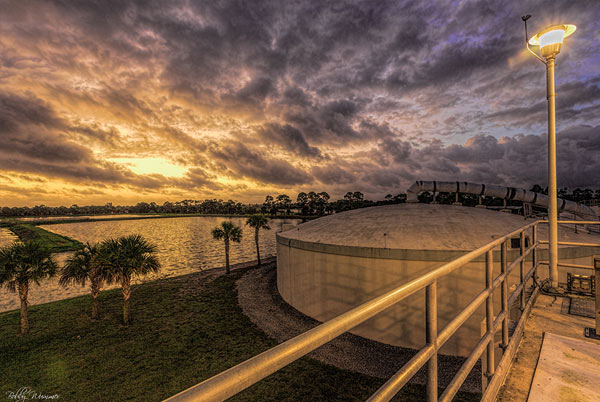
LRD Wastewater Tour: A Biological Process
This program is held at the Loxahatchee River District’s wastewater treatment facility learning about the biological process to create irrigation quality water for the community. Students will investigate the nitrogen cycle, perform water quality testing and discover new industrial technology that is used on a community scale. Students will recognize the importance of water reclamation in relation to water conservation.
Recommended: Grades 9-12 (adaptable for 7-8)

Water Quality of the Loxahatchee River
(Available for groups 25 or less)
Students will learn and recognize the factors that influence or change water quality in the Loxahatchee River. They will discover the challenges of estuary species affected by water quality changes (aquatic plants, oyster, juvenile fish, invertebrates, bacteria). Students will work in teams to conduct water quality testing and recognize parameters that identify changes and potential hazards. Through this lesson, students will understand importance of water resources and conservation.
Recommend: Grades 7-8 (adaptable for 9-12)

Fish Dissection Lab
$5 lab fee per student – (Available for groups 25 or less)
Using proper dissection tools and techniques, students will be working in pairs performing a scientific dissection of a fish. Students will get hands-on experience with understanding the anatomy, characteristics, and adaptations of common fish. Contact the River Center directly for reservations and more details.
Recommended: Grades 9-12
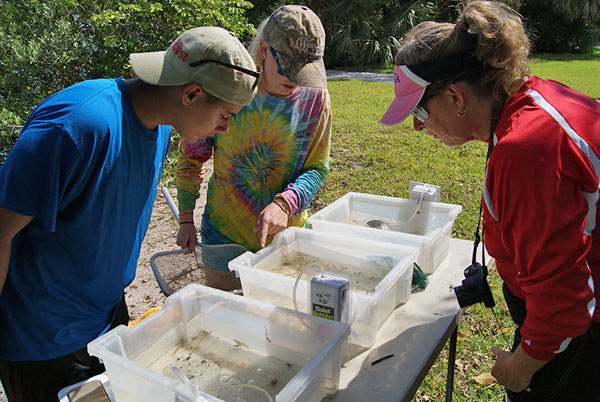
Middle and High School – Design Your Own
Teachers work directly with a River Center Environmental Educator to design a program to meet the objectives of the science topic utilizing our multimedia classroom, wet/dry lab equipment, and outdoor setting. Please contact the River Center directly.


